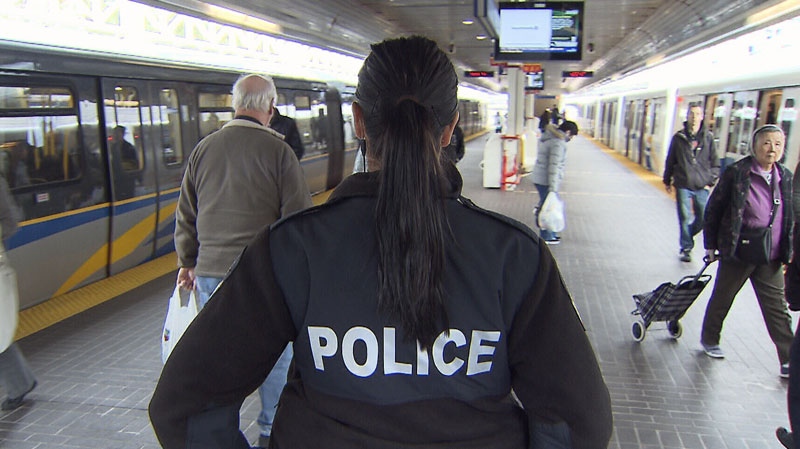Metro Vancouver Transit Police files hacked in raid linked to Russian extortion gang
 A Metro Vancouver Transit Police officer is seen at a SkyTrain station in this December 2021 file image.
A Metro Vancouver Transit Police officer is seen at a SkyTrain station in this December 2021 file image.
Metro Vancouver Transit Police say the agency was targeted by hackers who accessed almost 200 of its files as part of a global wave of attacks that U.S. officials have blamed on a Russian cyber-extortion gang.
The police service says in a news release that a thorough review is underway to determine what information was contained in the 186 files that were accessed in the attack on a third-party file transfer system called MOVEit.
It says the hackers did not gain access to the Transit Police network, and the software vulnerability has been patched and repaired.
The agency says it's not expected the incident will have any impact on investigations or prosecutions.
It says an investigation is being conducted by the RCMP's cybercrime investigative teams in Montreal and Vancouver.
MOVEit, which is widely used by businesses and government agencies to share files, was hit recently by an extortion syndicate that last week gave its victims a deadline to negotiate a ransom or risk having sensitive data dumped online.
The Cl0p gang, among the world's most prolific cybercrime syndicates, also claimed it would delete any data stolen from governments, cities and police departments.
Other known victims include the Nova Scotia provincial government, Louisiana's Office of Motor Vehicles, Oregon's Department of Transportation, British Airways, the British Broadcasting Company and the British drugstore chain Boots.
The parent company of MOVEit's U.S. maker, Progress Software, alerted customers to the breach on May 31 and issued a patch. But cybersecurity researchers say scores if not hundreds of companies could by then have had sensitive data quietly taken.
Jen Easterly, director of the U.S. Cybersecurity and Infrastructure Security Agency, told reporters last week that the Cl0p campaign was short, relatively superficial and caught quickly.
A senior official in the security agency said the U.S. has “no evidence to suggest co-ordination between Cl0p and the Russian government.”
With files from The Associated Press.
This report by The Canadian Press was first published June 19, 2023.
CTVNews.ca Top Stories

'They thought he wasn't making it': B.C. soccer star's family on his shocking shooting — and remarkable recovery
Born and raised in Metro Vancouver, Nathan Demian was living his dream playing soccer for top-ranked Ohio State University, when he was shot during a post-game pizza run with his brother Saturday night.
MPs approve $21.6B in supplementary spending; Conservatives vote against
Parliament has approved $21.6 billion in government spending, in a late Tuesday vote in the House of Commons.
No injuries reported after gunshots fired inside Etobicoke high school, 2 suspects outstanding
Toronto police are searching for two suspects after gunshots were fired inside an Etobicoke high school late Tuesday afternoon.
DEVELOPING Luigi Mangione shouts as he is led into courthouse where he contests extradition to N.Y.
The suspect in the killing of UnitedHealthcare’s CEO struggled with deputies and shouted Tuesday while arriving for a court appearance in Pennsylvania, a day after he was arrested at a McDonald’s and charged with murder.
Celebrities and coastal residents flee from wind-driven wildfire in Malibu
Evacuation orders and warnings have gone out to 20,000 Southern California residents Tuesday as firefighters battled a wind-driven wildfire in Malibu that burned near celebrities' seaside mansions, horse farms and Pepperdine University, the sheriff's department said.
Waterloo Region mistakenly applied $13.7M discount to Amazon build in Blair
The Region of Waterloo will not be able to demand $13.7 million from a developer after they said a discount was mistakenly issued for the development of an Amazon fulfillment centre.
Dolly Parton explains why her longtime husband doesn't attend events with her
Dolly Parton has been married for 58 years, but you probably could count on one hand the times you have seen her with her husband.
'Which one of those two is going to win?': Poilievre prods Trudeau, Freeland over spending tension
Revived talk of tensions between Prime Minister Justin Trudeau and Deputy Prime Minister and Finance Minister Chrystia Freeland prompted new questions Tuesday, about how big the federal deficit will be in next week's economic update.
Ex-minister cites 'threat to security' for denying emergency passport to Abdelrazik
Former foreign minister Lawrence Cannon says he denied an emergency passport to Abousfian Abdelrazik in 2009 because he considered the Montreal man a possible threat to national security.
































